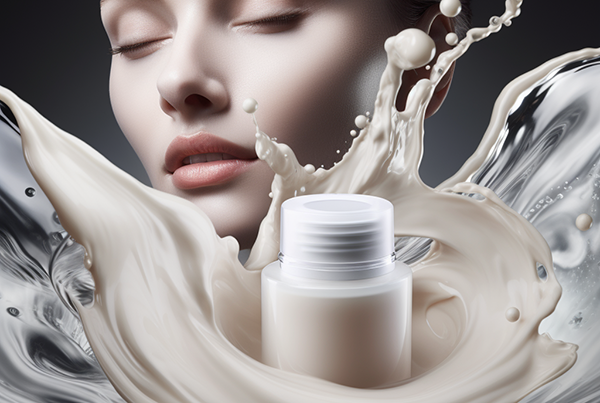You might already know about vitamin C’s starring role in skin care, such as its hydrating properties and ability to boost collagen productionTrusted Source, among other benefits.
Still, you might be surprised to learn that when it comes to this useful antioxidant, there’s more than one version out there.
Ascorbyl glucoside is a derivative of L-ascorbic acid, aka vitamin C. But unlike regular vitamin C, which can sometimes irritate the skin, ascorbyl glucoside is much more gentle.
“It’s a less potent form of vitamin C,” explains certified aesthetician Edyta Jarosz, “so it can be a great alternative if you have sensitive or irritated skin.”
Plus, its excellent water solubility means ascorbyl glucoside can be used with other ingredients and in water-based skin products, like serums.
It’s often incorporated into topical products to provide similar benefits to vitamin C, such as increased antioxidant protection and skin radiance, Jarosz notes.
“Being more compatible with water allows for a very pleasant serum texture,” she says.
Here’s what to know about vitamin C’s gentler cousin, plus a few product recommendations so you can try it for yourself.
You’ll find a few different forms of vitamin C commonly used in skin care products:
- L-ascorbic acid, the pure form of vitamin C, is water-soluble like ascorbyl glucoside. But it’s also fairly unstable, especially in water-based or high pH solutions. It oxidizes quickly and can be irritating to the skin.
- Magnesium ascorbyl phosphate is another water-soluble derivative with hydrating benefits. It’s not as potent as L-ascorbic acid, and in high concentrations, it requires emulsification. You’ll often find it as a lighter cream.
- Sodium ascorbyl phosphate is a lighter, less intense version of L-ascorbic acid. It’s similar to ascorbyl glucoside in stability. While it may be less likely to cause irritation than some forms of vitamin C, it could potentially irritate sensitive skin.
- Ascorbyl tetraisopalmitate is an oil-soluble derivative, so it penetrates the skinTrusted Source much faster than other forms — but some evidence does suggest creams containing this ingredient could cause skin irritation after use.
To understand the benefits of ascorbyl glucoside, it helps to know the main benefits of L-ascorbic acid.
“L-ascorbic acid is a powerhouse as a topical skin care ingredient,” says Anar Mikailov, MD, FAAD. According to Mikailov, this antioxidant helps:
- protectTrusted Source against free radical damage
- repair the effects of UV exposure
- brighten skin by reducingTrusted Source melanin production
- increase collagen levels to improve skin elasticity
When you apply ascorbyl glucoside topically, it can penetrate your skin and convert to L-ascorbic acid, according to Mikailov. In short, it delivers much the same benefits with less potential to irritate your skin.
Because it’s stable in different pH environments, this form of vitamin C is easier to use in varied skin care formulations, too.
“It may not be as potent compared to L-ascorbic acid, but it’s comparable to other derivatives,” says Mikailov.
Here’s the good news: Ascorbyl glucoside doesn’t really have any major drawbacks. Most people tolerate it well.
“Because it’s a less potent version of vitamin C, it’s a good option for all skin types and anyone looking to brighten a dull complexion, enhance radiance, and diminish fine lines and wrinkles,” says Jarosz.
Still, it’s always wise to do a patch test before using it on your entire face.
How to do a patch test
- Apply a small amount of the product to a small area of skin on your face, such as along your jaw or behind your ear.
- Leave the area alone for 24 to 48 hours.
- Check for any adverse reactions, including itchiness, inflammation, or other irritation.
- If you don’t notice any side effects, you can go ahead and use it on the rest of your face.
If you know you have an allergy or sensitivity to other forms of vitamin C, you may want to avoid this ingredient in your skin care products, too.
Always stop using a product and check with a dermatologist if you notice any irritation or discomfort.
“Ascorbyl glucoside, and in general all other vitamin C products, are great to use in both day and nighttime routines, especially in leave-on products like serums, masks, eye creams, and moisturizers,” says Mikailov.
Vitamin C and its derivatives pair particularly well with sunscreen because the antioxidants can help boost your sunscreen’s effectiveness.
According to Mikailov, ascorbyl glucoside can also be used with other skin care ingredients such as:
- hyaluronic acid
- other antioxidants like vitamin E
- niacinamide
- retinol
You can experiment with using ascorbyl glycoside in the morning and again at night.
Using ascorbyl glycoside in a serum? You’ll typically want to apply the serum after cleansing and before moisturizing. Otherwise, follow the directions listed on the product.
Ingredients to avoid with vitamin C
Both experts advise against using products containing ascorbyl glycoside with benzoyl peroxide, since benzoyl peroxide oxidizes vitamin C.
“If you are using benzoyl peroxide to address acne, try alternating days,” advises Mikailov. He also recommends alternating your routine to avoid using ascorbyl glycoside at the same time as exfoliating acids like alpha hydroxy acids (AHAs) or beta hydroxy acids (BHAs).
You’ll find ascorbyl glycoside in a range of skin care products. A few options to consider adding to your routine include:
- Sweet Chef Ginger + Vitamin C Fresh Pressed Sheet Mask: Try using this gentle, affordable sheet mask once or twice a week.
- La Roche-Posay Anthelios AOX Daily Antioxidant Serum SPF 50: This lightweight serum with SPF 50 may be a great option for daytime use and may be a good choice if you have oilier skin.
- Avène A-Oxitive Antioxidant Defense Serum: This lightweight, hydrating serum works may well for day or night, and it’s designed to be gentle enough for sensitive skin.
- The Ordinary Ascorbyl Glucoside Solution 12%: This water-based serum may work well for anyone who prefers to avoid products with oily textures.
- Kora Organics Berry Bright Vitamin C Eye Cream: Try this cream as a gentle option to brighten the thinner, delicate skin around your eyes and help reduce the appearance of fine lines and address pigmentation.
Vitamin C is a darling in the skin care world for a reason — it can offer pro-aging support while helping brighten dull skin and balance out an uneven skin tone.
If you’ve found plain vitamin C too irritating for your skin, ascorbyl glucoside could offer a gentler approach toward getting those benefits.
And since this ingredient works well in different skin care products, you’ll find it in everything from serums and sheet masks to eye creams. In short, you have plenty of options for trying it out.






